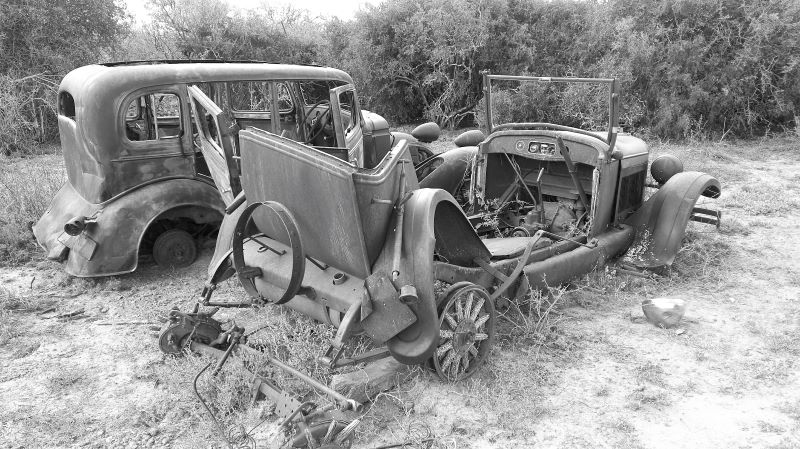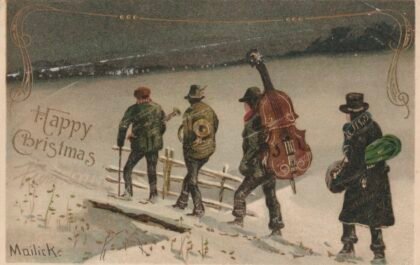
Mr Somov came to stay with us at the ranch after he was released from the hospital. He couldn’t go home to his canyon retreat, not until his broken leg was better. Once he was on his feet again and able to get around with crutches, Aunt Maddie arranged for him to stay at the Nakamura family’s empty farm house. They already knew about the fire. I wrote all about it to Kitty, to let them know that her dog and all of the things that her family left with us for safekeeping were safe, and that the farm house wasn’t harmed by the fire, although the flames burned right up to the edge of the abandoned fields, where the strawberries and bright geraniums were being overgrown with a crop of weeds.
Jessie and I went to check on Mr Samov’s cavelike, stone cabin with Mr Calzada. It hadn’t burned. Even Mr Somov’s beloved books were safe, but the trail that led up to the hidden mesa looked very different. It was completely scoured by the fire and the beautiful oak grove had burned.
“Give them time,” Mr Calzada comforted us. “Oak trees are tough. If we get enough rain this winter they will recover. Fire is part of life here. These trees are old. They have seen fire before and will live to see it again.”
The tree fort that Jessie and I had spent all summer building had also burned. The oak that had sheltered and supported it was scorched black. There wasn’t a leaf left on it, and all of the other trees and bushes that lined the creek and made it green and shady were burned away, too. Jessie and I talked about rebuilding the fort, but somehow our hearts weren’t in it. It wasn’t the same after the fire, and maybe we weren’t the same, either. There wasn’t much time for things like that anyway. We had a lot more school work this year, and that lost week meant a lot of catching up. Jacob had even more schoolwork than we did, but he continued to do well. At Aunt Maddie’s urging he began thinking about applying to go to college.
I think maybe the fire helped Jacob realize that he really did belong here, that the ranch was home. He talked less about Kansas and the past, and more about the future, a future that he had never imagined for himself. I didn’t mind his moods any more. The fire helped me to see that he belonged here, too. Surviving the fire was like a miracle. The wonder of knowing that the ranch and all the lives it sheltered had come through unscathed was slow to fade. It was an oasis of life and comfort in a stark gray landscape of dust and ashes.
It took a long time for things to get back to normal after the fire. It was strange to see how much of a mark people had left on the land. Things that were invisible beneath the thick plants were suddenly laid bare. Jessie and I found the foundations of old homesteader houses that we never knew were there. Some of them even still had their chimneys intact. One of them had the date “1898” carved into a stone above the hearth.
Jessie and I weren’t the only ones who were fascinated by the changes in the landscape after the fire. Jacob took us to see a box canyon he found that had the wreckage of a whole lot of old cars at the bottom of it. I thought maybe there would be something that Mr Zelle could use for his Duro Car restoration project, but everything was rusted and burned over. The one treasure we retrieved as an old hood ornament shaped like a lady’s face, with a winged helmet and flowing hair.
“It’s from a Buick,” Aunt Maddie said, when we showed it to her. “I think you might have solved an old mystery, Jacob. There was a series of unsolved car thefts around here in, oh, around 1927. I wonder if that canyon is where they ended up?”
“Don’t let Mrs Browning know about it,” Jessie cautioned. “She’ll want all of it for the scrap drive.”
“That’s a really good idea,” Jacob replied. “There must be tons of metal back there and it would be a way to help the war effort.”
Jessie hadn’t exactly hit it off well with Jacob in the beginning, but once he became part of the ranch family she made her peace with him. She confessed to me that having Jacob there was a little like having her brother Dan back.
“I wish Dan would write,’ she sighed. “I wish I was out there with him. It’s not fair that girls can’t go to war, or if they do they get assigned to boring things at home, like your sister.”
My sister would have agreed with her. Instead of being sent to serve in the Pacific the way she envisioned when she signed up for the WACs, she was now stuck at a military base in Washington, where she worked as a chauffeur, driving the officers around.
I had hoped she would be able to come out for Thanksgiving, but she couldn’t get leave. I knew I had a lot to be thankful for, but I missed her. This was my first Thanksgiving without her and Father. It wasn’t like the Thanksgivings we used to have. The weather was still warm and dry and sunny, nothing like November in Illinois. The Calazadas had gone for the whole week to spend the holiday with their grownup daughter and her family up north.
“They deserve a holiday if anyone does,” Aunt Maddie said.
She and Jacob and I had a wonderful time cooking our holiday dinner. Aunt Maddie was a really good cook, although not always a tidy one. “I’ve had plenty of experience,” she said. “Your Uncle Jimmy and I used to make Thanksgiving dinner out of practically nothing. It’s such an amazing luxury to be able to have almost anything you wish, and the war is a reminder that abundance is a gift, not an entitlement,” she said with a sigh.
Jacob and I cracked nuts for the stuffing, peeled and mashed potatoes, whipped cream, and cleaned up the aftermath, which included washing almost every saucepan and mixing bowl in the kitchen at least twice. Yuki the dog stationed himself underfoot, in the hope that something more exciting than potato peelings would fall his way, but Mouse didn’t approve of all of the noise and fuss. He whisked himself out of the way, only emerging to sample the whipped cream.
We invited Mr Zelle and Mr Somov, and Bob and a couple of the other guys from the Coast Guard station who weren’t on duty. Mrs Browning came for dinner, too. She brought a huge bouquet of sunflowers and two gorgeous apple pies.
“I just love Thanksgiving,” she told me. “But my husband is more of a Halloween person,” she confided.
I could believe it after hearing everything Jessie had said about him. Jessie wasn’t there. Her family always celebrated Thanksgiving at a restaurant in town. I promised to save her a piece of pie. I wished I could send one to Kitty, too. I wondered what her Thanksgiving was like in that cold and dusty desert prison.
You wouldn’t think such a different group of people would have much to say to one another—the only thing that connected each to the other was their connection with Aunt Maddie—but Thanksgiving was fun. Aunt Maddie and Mrs Browning told stories about Malibu in the 1920s, when the coast was used by rum runners. The guys from the coast guard station had funny stories about getting used to life at the camp, and the rich and eccentric family who owned the big house where they were camping out. They were all fascinated by Jacob’s description of the canyon full of old cars. Jacob promised to show Mrs Browning, and the guys from the Coast Guard station volunteered to come, too, and help with the salvage. Everyone was full and content when dinner was over.
The weather had changed while we were busy with cooking and eating. Clouds were rolling in when our guests headed for home. It had begun to rain by the time we had the dishes washed and were headed to bed. The last thing I heard as I drifted off to sleep was the steady beating of rain on the roof.
Mrs Browning never got a chance to get her hands on those old cars for scrap, because the rain flooded everything. It rained for days. Mud, ash and fire debris washed down the creeks in torrents, turning the ocean water opaque and brown and covering the beach in debris. There were pieces of porches and roofs. There were animal bones and paint buckets, barbed wire still attached to fence posts, and entire trees—roots and all. It was fascinating but also depressing.
Jacob, and I missed several more days of school because of the rains and the mudslides they brought. Jessie was disgusted about it. She was stuck in town the whole time because of the road closure. Mr Calzada kept us entertained, teaching us to braid horsehair. He knew how to weave all kinds of patterns from the coarse strands. I wasn’t very good at it yet, but it was fun and there was plenty of material to practice with. Aunt Maddie’s horses had long manes and tails. All I had to do was gather up the loose hairs when I groomed them. I stuck with it after Jacob gave up. It was something to do when it was too muddy to go out—a person couldn’t play the piano all the time, although I put in many hours of practice that autumn, waiting for the rain to stop.
The rain brought new life and new growth to the hills. Ferns unfurled from the scorched earth. The chilicote vines began to spread long tendrils, covering the hillsides, shoots appeared from the tough, deep roots of the sumac and ceanothus bushes, and grass and other seeds began to sprout. A gentle green fire was sweeping over hills stripped bare by flame, softening the stark landscape, bringing life and color back again.




